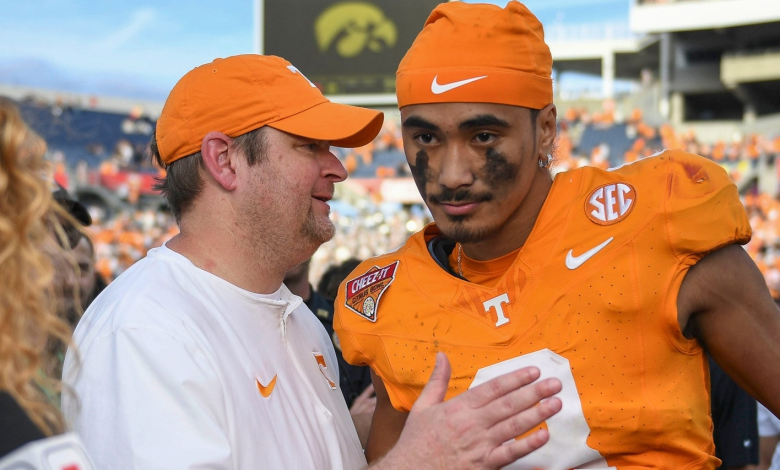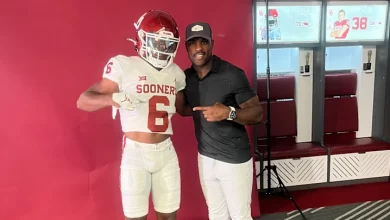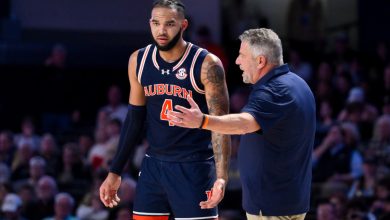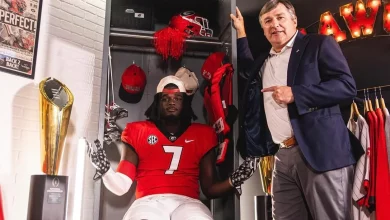Nico Iamaleava’s Camp Says ‘We Did Nothing Wrong’ In Breakup with Tennessee

The world of college football recruiting is never short of drama, but few stories have generated as much attention as the recent breakup between Nico Iamaleava, the highly touted five-star quarterback, and the University of Tennessee. As one of the most coveted recruits in the nation, Iamaleava’s decision to part ways with the Tennessee Volunteers has caused ripples throughout the college football landscape. Following this breakup, Iamaleava’s camp has issued a statement emphatically asserting that they did nothing wrong in the process.
In the eyes of the public, this declaration raises numerous questions: What led to this split? What does it mean for Iamaleava’s future? And what does the assertion that they “did nothing wrong” truly imply? This article aims to explore the full context behind this high-profile departure, the potential factors that led to the breakup, and the broader implications for both Iamaleava and Tennessee. We will also examine what this situation tells us about the evolving nature of college football recruitment in the modern era.
1. Who is Nico Iamaleava?
Before diving into the drama of his breakup with Tennessee, it’s important to understand just why Nico Iamaleava has been so highly regarded throughout his football career.
Iamaleava is widely considered one of the top quarterback prospects of his generation. A native of Long Beach, California, Iamaleava burst onto the scene as a high school quarterback with a skill set that made scouts and analysts sit up and take notice. Standing at 6’5″ and weighing approximately 200 pounds, he has the ideal physical profile for a modern quarterback. His combination of size, athleticism, and arm strength is rare, and he possesses the kind of mobility that allows him to make plays both in the pocket and on the run.
At the high school level, Iamaleava displayed a rare poise and accuracy, especially when throwing deep balls. His ability to lead an offense and manage the pressure of being a top recruit showed a level of maturity that is typically seen only in seasoned collegiate players. Throughout his time at Long Beach Poly High School, he demonstrated that he could perform under the brightest lights, making him an obvious candidate for top programs around the country.
His recruitment has been one of the most closely watched in recent years, with schools from all over the country vying for his services. The consensus among talent evaluators was clear: Iamaleava has the potential to be a future NFL star, and the program that could land him would be receiving a game-changing talent.
2. The Initial Commitment to Tennessee
Iamaleava initially committed to the University of Tennessee, a school that had emerged as a surprise powerhouse in recruiting. Under head coach Josh Heupel, Tennessee had made significant strides, and landing a quarterback like Iamaleava was seen as a huge step forward for the program. Iamaleava’s decision to commit to Tennessee was a significant moment for the Volunteers. They had successfully landed a player who could potentially become the cornerstone of their offense for years to come.
This commitment was also viewed as a sign of how far Tennessee had come as a program under Heupel. Tennessee had struggled for years in the post-Peyton Manning era, but with the acquisition of Iamaleava, it seemed they were poised to return to prominence. For many, the quarterback position had been a missing piece in Tennessee’s puzzle, and the commitment of a player like Iamaleava signaled hope for the future.
Iamaleava’s decision was widely celebrated, both by Tennessee fans and analysts alike. The excitement surrounding the prospect of having one of the most coveted quarterbacks in the country in Knoxville was palpable, and it seemed like a perfect fit. Iamaleava’s style of play, which emphasizes both a powerful arm and mobility, fit well with Heupel’s high-octane, fast-paced offense. It seemed like a marriage made in heaven.
3. The Breakup: What Went Wrong?
Despite the initial excitement surrounding Iamaleava’s commitment, things began to take a turn for the worse. The details surrounding the breakup between Iamaleava and Tennessee remain somewhat unclear, but it is evident that the relationship between the quarterback and the program started to deteriorate over time.
While there has been no official statement from Iamaleava or Tennessee detailing the reasons for the split, several factors could have contributed to the breakup. The most likely reasons center around two main issues: a misalignment between Iamaleava’s long-term goals and Tennessee’s immediate needs, and the pressures that come with being a high-profile recruit.
Misalignment of Goals and Expectations
One of the primary reasons for the breakup could be that Iamaleava and Tennessee were not aligned in terms of their long-term goals. While Tennessee was undoubtedly excited to land a quarterback of Iamaleava’s caliber, it’s possible that the young quarterback began to have second thoughts about his fit with the program.
Ilamaleava, given his talent, likely expected to come into a program where he could make an immediate impact. However, Tennessee’s development as a program under Heupel was still a work in progress. The Volunteers were in the midst of rebuilding, and it’s possible that the team’s overall trajectory didn’t align with Iamaleava’s personal aspirations.
Moreover, Iamaleava’s camp likely had certain expectations about how he would be utilized in Tennessee’s offense. If those expectations were not met or if the coaching staff’s vision for Iamaleava’s role didn’t match his own, it would have been a significant point of friction.
The Pressure of Being a High-Profile Recruit
The pressure of being a five-star recruit cannot be overstated. Iamaleava had long been the subject of intense scrutiny, and it’s possible that the weight of this expectation started to take its toll. The media attention, the expectations from fans, and the hype surrounding his potential may have made it harder for Iamaleava to stay focused on the task at hand.
For a young player, the spotlight can be overwhelming, and while some players thrive under the pressure, others may find it difficult to navigate. It’s possible that Iamaleava’s camp felt that the external pressures of being at a high-profile program like Tennessee were starting to become too much to handle, leading them to seek a new environment where the focus could be more on development rather than on living up to the hype.
4. The Statement: ‘We Did Nothing Wrong’
In the aftermath of the breakup, Iamaleava’s camp has been vocal about their perspective on the situation. The camp’s statement, “We did nothing wrong,” signals that they believe the decision to part ways with Tennessee was made in good faith and with careful consideration.
This statement likely serves as a defense against any insinuations or negative press that could be coming their way. There have been instances in the past where players have been accused of being “divas” or too focused on individual goals rather than team objectives. Iamaleava’s camp, by asserting that they did nothing wrong, is pushing back against this narrative and emphasizing that their decision was made based on what they felt was best for the quarterback’s future.
The statement also indicates that Iamaleava’s camp is not trying to place blame on Tennessee. Instead, they are emphasizing that the decision was mutual and made with the long-term well-being of Iamaleava in mind. This can be seen as an attempt to protect both Iamaleava’s image and the integrity of the Tennessee football program.
5. The Fallout: What Does This Mean for Iamaleava?
Now that Iamaleava has parted ways with Tennessee, the question is: What’s next for the young quarterback?
Given his immense talent, it’s almost certain that Iamaleava will find a new home quickly. His recruitment is bound to draw interest from a number of top-tier programs, and there will be no shortage of schools lining up to secure his services. Whether he chooses to transfer to a program with a more established offense or seeks a new challenge at a program in need of a quarterback to build around, Iamaleava’s future remains extremely bright.
However, this situation will undoubtedly affect how he is perceived in the media and by college programs. Some may view the breakup as a cautionary tale about high-profile recruits and their ability to manage expectations, while others may see it as a player simply choosing to put his career first. Regardless of the perspective, Iamaleava’s ability to move forward and focus on his development will be crucial in determining his future success.
6. The Implications for Tennessee
For Tennessee, the breakup with Iamaleava represents a missed opportunity. Having recruited one of the top quarterbacks in the country, the Volunteers were poised to make significant strides under Heupel’s system. With Iamaleava no longer in the picture, the program will need to pivot and focus on other avenues for securing a top quarterback.
However, while the departure is disappointing, Tennessee has a strong recruiting base and should be able to recover. Coach Heupel and his staff have proven themselves capable recruiters, and the program’s momentum could attract another quarterback of similar caliber.
Nico Iamaleava’s breakup with Tennessee is a complex situation, driven by various factors, including personal goals, expectations, and external pressures. While both Iamaleava’s camp and Tennessee may view the situation differently, the statement that they “did nothing wrong” speaks to a larger truth about the evolving nature of college football recruiting. The age of the Transfer Portal has introduced new challenges and opportunities for players and programs alike, and for Iamaleava, this chapter is just one step in his journey to finding the right fit for his future. Whether it’s Tennessee or another program, Iamaleava’s potential remains undeniable, and his next steps will be watched closely by the college football world.









